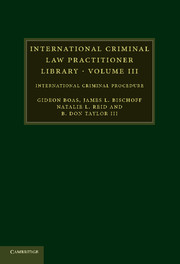Book contents
- Frontmatter
- Contents
- Foreword
- Table of authorities
- Table of short forms
- 1 The nature of international criminal procedure
- 2 Creation and amendment of rules of international criminal procedure
- 3 Procedures related to primacy and complementarity
- 4 Investigations, rights of suspects, and detention
- 5 Defence counsel, amici curiae, and the different forms of representation of accused
- 6 Pre-trial proceedings
- 7 Trial proceedings
- 8 The role and status of victims in international criminal procedure
- 9 Evidence
- 10 Judgement and sentencing
- 11 Appeal and revision
- 12 Conclusion
- Index
- References
5 - Defence counsel, amici curiae, and the different forms of representation of accused
Published online by Cambridge University Press: 05 August 2011
- Frontmatter
- Contents
- Foreword
- Table of authorities
- Table of short forms
- 1 The nature of international criminal procedure
- 2 Creation and amendment of rules of international criminal procedure
- 3 Procedures related to primacy and complementarity
- 4 Investigations, rights of suspects, and detention
- 5 Defence counsel, amici curiae, and the different forms of representation of accused
- 6 Pre-trial proceedings
- 7 Trial proceedings
- 8 The role and status of victims in international criminal procedure
- 9 Evidence
- 10 Judgement and sentencing
- 11 Appeal and revision
- 12 Conclusion
- Index
- References
Summary
In any criminal justice system, including those set up to try persons thought responsible for international crimes, fundamental human rights principles demand that accused persons have the ability to defend themselves against criminal allegations. Among these fundamental rights are the right to be represented by qualified defence counsel, at no cost if the accused cannot afford counsel; and, with certain limitations developed in the jurisprudence, the right to conduct their own defence. Defence representation before international criminal tribunals can take many forms, including privately funded defence counsel; tribunal-funded defence counsel; self-representation, which implicates a range of procedural and resource issues; and even the use of amici curiae to perform many of the tasks traditionally performed by defence counsel. There are two basic categories of legal representation in international criminal law: representation by counsel and self-representation. As will be discussed in some depth, these two different models of representation give rise to variants that impact significantly on the capacity of international criminal tribunals to deliver a fair trial.
This chapter considers the regulatory structure and jurisprudence relating to these different procedural models. Like most chapters in this volume, the chapter focuses mainly on the ICC, ICTY, and ICTR, with occasional reference to the SCSL, Special Tribunal for Lebanon (‘STL’), or another internationalised tribunal if their relevant procedures illustrate an innovative approach or otherwise aid the analysis of the key issues surrounding representation of accused persons. Where procedures across the tribunals vary significantly, we discuss each tribunal in a separate subsection.
- Type
- Chapter
- Information
- International Criminal Law Practitioner LibraryInternational Criminal Procedure, pp. 136 - 175Publisher: Cambridge University PressPrint publication year: 2011



